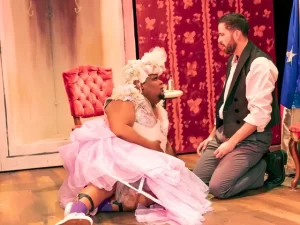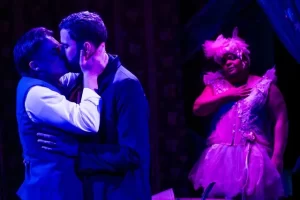
 **** About Face Theatre’s “Lavender Men” is a surreal play that is a celebration of queerness, written by Roger Q. Mason and directed by Lucky Stiff. Creative, exciting, but somewhat disconnected, the story tries to tackle important issues dealing with race, gender, sexual orientation, gender preference, and fat shaming all rolled into one. The production is a critique of an American culture that glorifies thinness, whiteness, maleness, and straightness. It stars Julian “joolz” Stroop as Taffeta, a trans character whose bold and aggressive charm makes the show! Stroop could not have put on a better performance! Taffeta is magical creature and a fairy in all senses of the word!* To quote the advance piece, Taffeta is an overweight “multi-racial femme” who wears taffeta clothing and is a time traveler par excellence. They use their fantasia to conjure up historical figures and decide whether or not to change history as we know it. Taffeta, it seems, lives in both the 19th century and today, breaks down the fourth wall and engages the audience. This adds an element of fun and surprise to a relatively serious story.
**** About Face Theatre’s “Lavender Men” is a surreal play that is a celebration of queerness, written by Roger Q. Mason and directed by Lucky Stiff. Creative, exciting, but somewhat disconnected, the story tries to tackle important issues dealing with race, gender, sexual orientation, gender preference, and fat shaming all rolled into one. The production is a critique of an American culture that glorifies thinness, whiteness, maleness, and straightness. It stars Julian “joolz” Stroop as Taffeta, a trans character whose bold and aggressive charm makes the show! Stroop could not have put on a better performance! Taffeta is magical creature and a fairy in all senses of the word!* To quote the advance piece, Taffeta is an overweight “multi-racial femme” who wears taffeta clothing and is a time traveler par excellence. They use their fantasia to conjure up historical figures and decide whether or not to change history as we know it. Taffeta, it seems, lives in both the 19th century and today, breaks down the fourth wall and engages the audience. This adds an element of fun and surprise to a relatively serious story.
Taffeta’s insertion into history opens up the possibility that the past can potentially be altered, hopefully in the direction of creating greater fulfillment for all. But should or could this reality shift actually take place? And will it happen during the course of the show? The play is a layering of American history with speculation on what might have been. Specifically, the story has to do with the life of Abraham Lincoln (Matt Martin) and poses the question: “What would have happened had Lincoln not been assassinated? What would his personal life have looked like?
The play hinges on a supposition that Lincoln might have been bisexual, although historically speaking, we don’t know if this is true. The script imagines that Lincoln might have wanted to pursue a relationship with Elmer Ellsworth (Shea Petersen) twenty-two years his junior. Ellsworth was once a drill sergeant in the U.S. Army; he and Lincoln meet when he becomes a law clerk at the state capitol in Springfield, Illinois, and then studies law under Lincoln. While they are known to be good friends, the idea that they may have pursued any type of intimate relationship is unknown. Yet the assumption the playwright makes is that he may have turned to a gay relationship, considering that his married life with Mary Todd Lincoln (Stroop) was not so easy.
Apparently, Mary Todd was extremely needy for power and privilege that she pushed her husband to run for President. Apparently, Lincoln could never please her, and eating to excess becomes a way to soothe herself and counteract her feelings of inadequacy and depression. Fat shamed by others because of her heftiness, we see how she unsuccessfully tries to remain on a diet to lose weight and yet her food addiction makes her feel even worse about herself in a society which values thinness. What makes things worse is that her husband, for his part, is tall and thin; and being her physical opposite only contributes to making her feel all the more miserable about her body image. It is certainly quite possible that the more Lincoln gets bogged down with the politics of the nation and the issue of slavery (and later the Civil War), it becomes likely that Mary Todd is left to deal with lots of personal and family issues on her own. Lincoln likely longed for some measure of peace and quiet: some respite from a troubled home environment. Quite possibly, he might have turned to Ellsworth not only in a professional capacity but in a way that went beyond mere friendship.
We all know our history and how Lincoln is shot and killed at Ford Theatre after the Civil War ends. But we probably don’t know that Ellsworth is the first Union officer to conspicuously die in the war, specifically when he removes a Confederate flag from the roof of the Marshall House inn in Alexandria, Virginia. But Taffeta can potentially change all this and allow both men to pursue their forbidden relationship and live together in peace and give both men future lives that they would not have otherwise had, that is, by creating an alternate universe.
Basically, Taffeta’s words and example point out a number of realities about American culture: that it largely remains the same as it did before and after the Civil War, and many of the stereotypes from back then are still present today. This includes the fact that straight, white, male, and thin people often harbor prejudicial attitudes towards black people, LGBTQ+ people, women, and those who are obese. And those people whom the majority straight white population deems as “not fitting in” to the mainstream (e.g., blacks, overweight, and queer people) are handed the cloak of invisibility. Hence, Taffeta becomes a tree in one scene and a light pole in another to demonstrate how being a racial minority and trans can be likened to being inanimate and invisible —and thus they can be ignored. At another point in the play, Lincoln has hired a formerly enslaved individual to be a domestic in his office. But even though Lincoln has provided them with employment, he never understands what it is like to be treated as second-class, what it means to be in their body.
Scenic designer Caitlin McLeod together with scenic painter Charlie Dewitt and props designer Amanda Herrmann have done a great job creating an extremely versatile 1850s-1860s set. This is complete with painted American flags on the walls to mimic an office in the Illinois state capitol and Lincoln’s law office, etc., plus wallpaper from that time period allows us to imagine other interior rooms. Especially significant are the portraits of George Washington and Mary Todd Lincoln. But what excels is this show’s use of lavender! According to Dictionary.com, “Lavender’s pale bluish-purple hue has been linked to gay people since at least the 1800s, originally in the context of fashion.” We see Taffeta’s ruffled crinoline skirt contains a hint of lavender as well as their shoes and garter; we also see it in Lincoln’s undershirt when he goes swimming. Costume designer Anna Wooden has done fine work in this regard! What excels, however, is lighting design by Benjamin Carne. Among other things, the lighting for the show is lavender for the steamy (but not outrageously graphic) sex scene. Sound design by Dee Etti-Williams works well for this small theatre.
What Taffeta does is to proclaim the joy in being a unique individual and the person you’re supposed to be. The underlying message is that we only hurt ourselves when we act the way other people expect us to do rather than to assert the authentic person whom we really are. The performance points up the ridiculousness of the hierarchy of those who are considered superior to whom in terms of race, gender, sexual orientation, gender preference, and physical appearance. The gist is that there is a spirit inside of ourselves that wants to be loved and respected and not shamed by others; the worst is when we put ourselves down for no reason or put ourselves in a box when we buy into prevailing cultural norms which maintain that some people are innately better than others. The production hints at working on a mind shift in the current day and age so that people of all shapes, sizes, colors, and orientations are valued and treated with respect and dignity.
“Lavender Men” is playing through June 8, 2024, at The Den Theatre, 1331 N Milwaukee Ave, Chicago.
$35 or pay-what-you-can. “If a $25, $15, or $5 ticket is right for you, please take advantage of that price…. Please note, there are limited quantities available at each level.”
Note that there is a $1.00 facility fee+ $5.75 Convenience Fee when ordering online.
Performance schedule:
 Thursdays and Fridays – 8:00 p.m.
Thursdays and Fridays – 8:00 p.m.
Saturdays – 3:00 and 8:00 p.m.
Sundays – 3:00 p.m.
MASKS REQUIRED PERFORMANCES:
Saturday, May 25 at 3:00 p.m.
Saturday, June 1 at 3:00 p.m.
UNDERSTUDY PERFORMANCE
Wednesday, June 5 at 8:00 p.m.
POST-SHOW DISCUSSION
Saturday, May 18 at 4:45 p.m., following the 3:00 p.m. matinee performance.
For more information about this show, go to: https://aboutfacetheatre.com/show/lavender-men/.
To purchase tickets, go to: https://ci.ovationtix.com/35386/production/1196127
or visit the Box Office at 1331 N. Milwaukee Avenue or online at boxoffice@thedentheatre.com.
For general information concerning About Face Theatre, see: https://aboutfacetheatre.com/.
*Originally used as an antigay slur, the term “fairy” has a complex history within the LGBTQ+ community, and it has been reclaimed by some as a symbol of the magic powers of queerness. It is now considered a positive name for radical gay identity.
To see what others are saying, visit www.theatreinchicago.com, go to Review Round-Up and click at “Lavender Men”.






More Stories
“Dummy in Diaspora”
“The Magic School Bus: Lost in the Solar System”
“February House” reviewed by Julia W. Rath